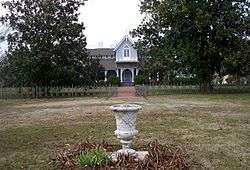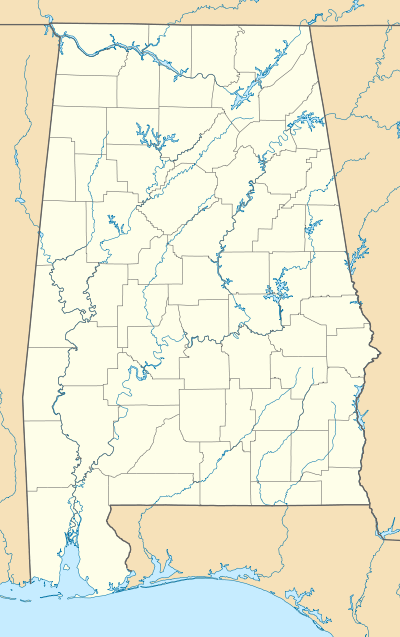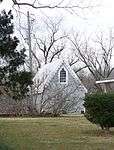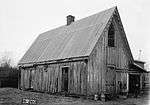Waldwic
Waldwic, also known as the William M. Spencer, III, House, is a historic Carpenter Gothic plantation house and historic district located on the west side of Alabama Highway 69, south of Gallion, Alabama. Waldwic is included in the Plantation Houses of the Alabama Canebrake and Their Associated Outbuildings Multiple Property Submission.[2] The main house and plantation outbuildings were added to the National Register of Historic Places on July 22, 1994.[3]
Waldwic | |
 Front elevation in 2008 | |
  | |
| Location | Gallion, Alabama |
|---|---|
| Coordinates | 32°29′4.99″N 87°42′49.64″W |
| Built | 1840, renovated 1852.[1] |
| MPS | Plantation Houses of the Alabama Canebrake and Their Associated Outbuildings Multiple Property Submission[2] |
| NRHP reference No. | 94000684[3] |
| Added to NRHP | July 22, 1994 |
History
The house for Robert Gracey started in 1840 as "an unpretentious galleried farmhouse"[4] and was then expanded and renovated in the Gothic Revival style in 1852.[1] The facade then resembled a rendering of “Waldwic Cottage” from volume two of William H. Ranlett’s "The Architect: A series of original designs for domestic and ornamental cottages and villas (1851)."[5] Ranlett could have been involved with the design of the renovation as he was retained by other wealthy southerners, but just as likely is that Ranlett’s design inspired the house and name (to which a “k” was eventually added). The carpentry work was completed by Peter Lee and Joe Glasgow, enslaved craftsmen from a neighboring Macon Station Plantation owned by Captain H.A. Tayloe. Lee and Glasgow also built St. Andrew's Episcopal Church (Prairieville, Alabama) (1853–1854) in the Carpenter Gothic style and the decorative interior woodwork. Gracey's widow remarried after Robert's death to Willis Bocock in 1856. The 1860 United States Census of Marengo County indicates that Bocock owned 127 slaves in that year and the 1870s map of Hale County list him as the owner still.[6] The Waldwic property was originally within Marengo County, but this portion of Marengo was added to Hale County upon its creation in 1867.[7] Robert Gracey's granddaughter, Bertha Gracey Steele, married at Waldwic in 1889 to William Micajah Spencer. He was a lawyer and was elected to the Alabama Senate in 1901.[8] The house is one of only about twenty Gothic Revival residential structures remaining in Alabama.[1] Other historic Gothic Revival residences in the area include Ashe Cottage in Demopolis and Fairhope Plantation in Uniontown.[3]
 Front and side elevation in 2008
Front and side elevation in 2008 HABS photo of the main house at Waldwic, taken in 1935
HABS photo of the main house at Waldwic, taken in 1935 Servant's quarters in 2008
Servant's quarters in 2008 The same servant's quarters in 1935
The same servant's quarters in 1935 Parlor windows in 1935
Parlor windows in 1935 Parlor fireplace in 1935
Parlor fireplace in 1935
References
| Wikimedia Commons has media related to Waldwic. |
- Gamble, Robert Historic architecture in Alabama: a guide to styles and types, 1810-1930, pages 89-90 . Tuscaloosa, Alabama: The University of Alabama Press, 1990. ISBN 0-8173-1134-3.
- Plantation Houses of the Alabama Canebrake and Their Associated Outbuildings MPS NRIS Database, National Register of Historic Places. Retrieved 6 March 2008.
- "National Register Information System". National Register of Historic Places. National Park Service. April 15, 2008.
- https://sah-archipedia.org/detail%2Fcontent%2Fentries%2FAL-01-065-0017.xml?q=%28section%3AAL-01%29%20AND%20decade%3A1840s
- https://sah-archipedia.org/detail%2Fcontent%2Fentries%2FAL-01-065-0017.xml?q=%28section%3AAL-01%29%20AND%20decade%3A1840s
- "1860 United States Census - Slave schedule, Marengo County, Alabama". United States Census Bureau. Rootsweb. Retrieved 2008-12-30.
- Marengo County Heritage Book Committee (2000). The heritage of Marengo County, Alabama. Clanton, Alabama: Heritage Publishing Consultants. p. 24. ISBN 1-891647-58-X.
- Owen, Thomas McAdory (1921). History of Alabama and Dictionary of Alabama Biography. Chicago: The S. J. Clarke publishing company. p. 1607.